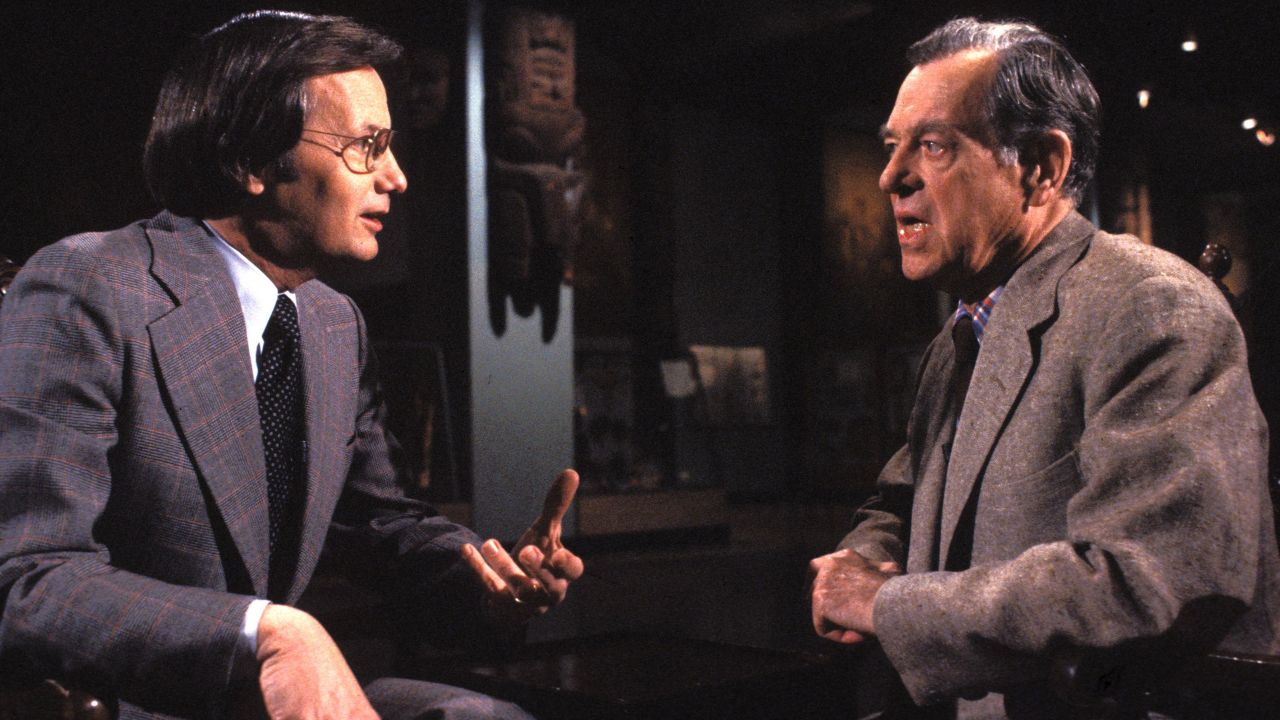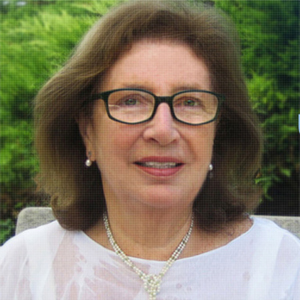
Bill Moyers and Joseph Campbell in conversation during the filming of Joseph Campbell and the Power of Myth in 1980. (Photo credit: Don Perdue)
Like so many others, I’ve been puzzling over the Trump phenomenon for months. It seems like every journalist, pundit, psychiatrist, psychologist and armchair psychologist has something to say about the man. Understandably, they are trying to figure out what kind of person he is and why he is so popular with millions of Americans, including nearly half of the Republican Party.
My own interest is undergirded by the work and ideas of the late Joseph Campbell, a foremost interpreter of world mythologies and author of The Hero With a Thousand Faces. It was said of Campbell that “he could make the bones of folklore and anthropology live,” as millions of viewers would learn in watching the classic PBS series Joseph Campbell and the Power of Myth. [Disclosure: I knew Campbell from my alma mater, Sarah Lawrence College, where he taught for 35-plus years. Many years later I served as executive producer of the Campbell-Moyers series.]
— Joseph Campbell
Campbell’s gift was to interpret the themes and forces underlying myths, stories and legends and how they play out in our lives. He illuminated the interior pathways of the mind which guide human behavior and action — a psychological roadmap within each of us which is nonetheless dark and mysterious to most of us.
One of the dominant highways on that inner map is the Hero’s Journey. The hero appears as a universal character in all cultures, everywhere, throughout human history, in myths and legends. It is so universal a theme that Campbell, along with other scholars and psychologists, called it an “archetype.”
According to Campbell, the hero emerges from humble beginnings to undertake a journey fraught with trials and suffering. He or she survives those ordeals and returns to the community bearing a gift — a “boon,” as Campbell called it — in the form of a message from which people can learn and benefit. So, properly, the hero is an exceptional person who gives his life over to a purpose larger than himself and for the benefit of others. Campbell had often lamented our failure as human beings “to admit within ourselves the carnivorous, lecherous fever” that seems endemic to our species. “By overcoming the dark passions,” he told Moyers, “the hero symbolizes our ability to control the irrational savage within us.”
Drawn to Campbell’s work, George Lucas invited him to Skywalker Ranch to share his insights into Star Wars. The two became friends, and it was at Skywalker in the mid-1980s that we taped most of the conversation that became the six-part PBS series. Campbell grew animated as he talked about how Lucas “has put the newest and most powerful spin” to the classic story of the hero: “It’s what Goethe said in Faust but which Lucas has dressed in modern idiom — the message that technology is not going to save us. Our computers, our tools, our machines are not enough… We have to rely on our intuition, our true being.” He admired Luke Skywalker for finding within himself “the resources of character to meet his destiny.” Furthermore, Campbell said:
I think that Star Wars is a valid mythological perspective, and the problem of it is that the system and the state are the machines. Is the machine going to crush humanity or serve humanity? Humanity comes not from the machine, but from the heart.
Darth Vader is an expression of the state and the system. [Darth Vader] isn’t thinking or living in terms of humanity. He is living in terms of the system [the dark side — which Carl Jung, the psychologist, would call “the shadow”].
This is a threat to our life. We all face it. We all operate in our society in relation to a system. Now, is this system going to eat you up and relieve you of your humanity, or are you going to be able to use the system for human purposes? …. Luke Skywalker is the hero, living as a human being within the system.
You see, this thing up here [he points to his brain], this consciousness thinks it’s running the shop. It’s a secondary organ. It’s a secondary organ of a total human being, and it must not put itself in control. It must submit and serve the humanity of the body.
A myth is a metaphor, explaining one thing in terms of another. In this case, our politics and politicians are “the government, the state, the system, the machine.” Our leaders in Washington are “the elites” who have long thought they are running the show. But our leaders have not been listening to the whole body, the body politic, the heart and soul of America.
Framing this campaign in the Campbell construct, Trump casts himself as Luke Skywalker fighting the inhumane system. He says he wants to destroy it and replace it with whatever he alone envisions — again and again he says, in effect, “I Am The Man.” His supporters and followers get it. They project the hero image in their own psyche onto Trump.
But does this make Trump a hero? Hardly. There is nothing he has said or done that suggests he wants to use the system for human purposes.
Let’s look at his own narrative, as he sees it:
Donald was a humble boy, not born in great luxury. He was not rich, or at least not the richest in his own eyes. His father was a success but only in Queens, the poor relative of Manhattan — and Trump sets out to conquer it.
He meets obstacles on the way, but prevails. Donald Trump — always a winner. To accomplish this, he has sacrificed — as he sees it, a sacrifice as great as losing a son in war. His sacrifice has been to make billions from building a business. So what if his successful father staked him in the beginning with capital to help make his journey easier and more comfortable? The elder’s sacrifice doesn’t count in the Trump version of his narrative, as it does in Star Wars.
Now Trump says he wants serve a higher purpose, to give his life to something bigger than himself — to the country, to history — by winning the presidency. If he prevails, he will show his country how to be great again by also winning. The message he brings back to his people: Everyone in Washington is stupid or corrupt. America should be like me, like Donald Trump.
No doubt many of Trump’s followers hate the system he’s fighting, one in which technology and trade have beaten them down, have made them losers. In their eyes Trump is a winner. He presents his own successes as a gift that others could enjoy if they elect him: his third wife, the fairest of them all — a virtual mannequin on which to hang his manhood; his children, who appear to be constructed by highly paid artists to make them seem perfect and who are following in their father’s own perfect footsteps, starting at the top; and, finally, his buildings all over the world — the most gilded (if not always the tallest), and bearing his name in capital letters.
But the truth is there is no hero there. Trump is the very personification of the system that enabled him to win — a white, wealthy, powerful male who dominates everything in his orbit, the white supremacist writ large who would make America over in his own violent image.
So the question arises: Is Trump, then, Darth Vader? It’s tempting to answer yes. Campbell said that “when the mask of Darth Vader is removed, you see an unformed man, one who has not developed as a human individual. What you see is a strange and pitiful sort of undifferentiated face.” When we look at Trump, we have to ask: Where is the humanity?
But Donald Trump is not Darth Vader. He may actually be worse. Darth Vader knows better than to want to destroy the system and set out instead to harness it to his purpose. Trump is on no hero’s journey. His is a journey of self-destruction, hate and cruelty. Unlike the hero who serves humanity, Trump is simultaneously serving his own self-destructive “dark side” while calling forth America’s dark side — bullies obsessed with money, power and materialistic success, absorbed with their own hubris and empire. Instead of trying to improve the system and make it better for all, he is trying to blow it up. The alternative he offers would be chaos.
Despite all of its flaws and failings, our democratic system has produced some of the best expressions of positive human effort and ideals so far in history. Most Americans want our government to work and we want to make it work better — but not by destroying it. We want to win over the dysfunctions of the system. We want to get our country back in order to get it going again — in the right direction, serving most of the people, most of the time. If only “the elites” — Republicans and Democrats and independents — would hear what the majority of Americans on all sides are saying, Trump would suddenly be irrelevant, exposed as Darth Vader was in the final scenes of Star Wars — a puny and pathetic farce.
As this campaign makes abundantly clear, no hero is going to swoop in to save us. We have to be our own heroes.




